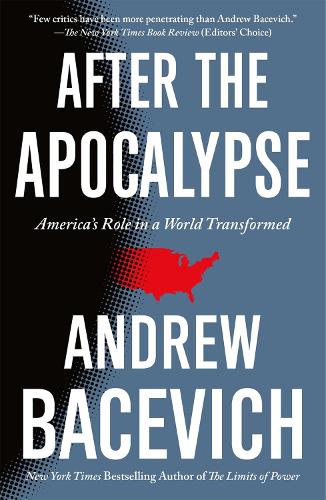
After the Apocalypse: America's Role in a World Transformed
(Paperback)
Publishing Details
After the Apocalypse: America's Role in a World Transformed
By (Author) Andrew Bacevich
St Martin's Press
St Martin's Press
11th October 2022
United States
Classifications
General
Non Fiction
Central / national / federal government policies
Warfare and defence
International relations
327.73
Physical Properties
Paperback
224
Width 135mm, Height 208mm
196g
Description
The purpose of U.S. foreign policy is, at least theoretically, to keep Americans safe. Yet as we confront a radically changed world, it has become clear that the terms of that policy have failed. Washington's insistence on a market economy, its faith in the idea of the "West" and its "special relationships," its conviction that military primacy is the key to a stable and sustainable world order-these have brought endless wars and a succession of moral and material disasters. In a bold reconception of America's place in the world, informed by thinking from across the political spectrum, historian Andrew Bacevich lays down a new approach based on moral pragmatism, mutual coexistence, and war only as a last resort. Confronting the threats of the future-climate change, a shift in the international balance of power, and the rise of information technology as a weapon of war-his vision calls for a profound overhaul of our understanding of national security, setting out new principles to guide the once-but-no-longer sole superpower as it navigates a transformed world.
Reviews
Few critics [of the Iraq and Afghanistan Wars] have been more penetrating than Andrew Bacevich . . . One can only hope that Bacevich is read and understood by a generation young enough to see through and reject those dismal elites.
--The New York Times Book Review (Editors' Choice)
A timely, angry, deeply necessary book about the habits of mind that have damaged America, and how to change them.
--Peter Beinart, author of The Crisis of Zionism
In a sane country, the estimable Andrew Bacevich would be Secretary of a much-shrunken Defense Department. Deepened by his sense of history, this up-to-the-minute book is his answer to the big question: why is the most powerful nation on earth so ill-prepared to deal with the world it faces
--Adam Hochschild, author of Spain in Our Hearts
The proliferating crises of our moment have found their interpreter. In this piercing account, Andrew Bacevich explains how distinctively American attributes--from our national security state to our original sin of racism to our very self-concept as the world leader--have, in the 21st century, conspired to render the American people vulnerable where they live. Bacevich points the way forward in terms that Americans across party lines are likely to appreciate. Will their leaders
--Stephen Wertheim, author of Tomorrow, the World: The Birth of U.S. Global Supremacy
After the Apocalypse is a welcome act of heresy . . . that drives a central point home: America has stumbled, badly, and will complete its precipitous fall unless measures are taken to radically reform its failed and flawed relationship with itself and the world . . . A must read for any student or practitioner of American statecraft.
--Scott Ritter, former US Marine Corps intelligence officer
An excoriating call for change . . . Bacevich's arguments are well-informed and stoked by a sense of moral outrage. Readers will agree that U.S. foreign policy needs a massive rethink.
--Publishers Weekly
With a reputation for knowledgeable, incisive, and provocative readings of history, Bacevich delivers his latest addition to a growing body of thought-provoking work . . . Broad in its scope yet concise, this is an important nonconformist interpretation of American history.
--Kirkus Reviews
Although Andrew Bacevich never exonerates average citizens for their contribution to current problems, he excoriates elected officials for a shortsightedness based on both non-reflection and willful self-interest in dispensing blatant lies, failed solutions, and soothing nostrums.
--CHOICE
Author Bio
Andrew Bacevich is the author of The Limits of Power, Washington Rules, and, most recently, The Age of Illusions: How America Squandered Its Cold War Victory. His writings have appeared in the New York Times, the London Review of Books, and the American Conservative, among other publications. Having served in the army for twenty-three years, he is currently a professor emeritus of history and international relations at Boston University and founder and president of the Quincy Institute for Responsible Statecraft, a Washington think tank dedicated to foreign policy. He lives in Walpole, Massachusetts.
